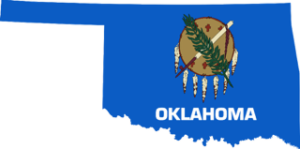A. In 1927, the local chapter of the Ku Klux Klan burned a cross on the lawn of Temple B’nai Israel, Oklahoma’s oldest synagogue still in operation. The klansmen left behind flyers telling the Jews to leave Oklahoma, with a headline that read “Shylocks of Oklahoma City–Go Away!” as reported in the headline of the Muskogee Phoenix newspaper. Thankfully there was no damage done to the synagogue and no one was hurt.
B. The headline in the Oklahoman newspaper referenced the annual Greek rush at the University of Oklahoma-Norman (a suburb of Oklahoma City) with the headline “Fraternity Prospects Dance with the Shylocks of Oklahoma City.” As part of the annual rush for new pledges, each fraternity put on a presentation for new freshmen. The school’s only Jewish fraternity, Alpha Epsilon Pi, presented a short play called The Merchant of Norman, based very loosely on Shakespeare’s The Merchant of Venice, featuring some of the fraternity members dressed like Shylock while dancing the hora.
C. In 1907, when Oklahoma became a state, the capital city was Guthrie. But a few years later it was proposed to move the capital to the larger city of Oklahoma City, much to the chagrin of Guthrie residents. A statewide vote was held and the move was approved, after which the Secretary of State, Leo Meyer, who was Jewish, stealthily moved the official state seal from Guthrie to Oklahoma City. The residents of Guthrie were outraged, and the Guthrie Daily Leader later ran an article with the headline “Shylocks of Oklahoma City Have State by the Throat.” Basically, the belief was that the Jewish merchants in Oklahoma City had conspired to have the capital moved for their financial benefit.
D. The complete headline, which appeared in the Dearborn Independent, read “Shylocks of Oklahoma City Spread the Dust Around.” The Dearborn Independent was Henry Ford’s weekly newspaper which regularly featured his antisemitic rants, blaming Jews for World War I, controlling the gold supply and American economy, and promoting the The Protocols of the Elders of Zion. This article was in response to the Dust Bowl storms which covered Oklahoma and much of the mid-west in the 1930’s. Ford blamed Jewish businessmen and bankers for usurious practices which put farmers out of business, leading to the drying up of the fields that fed the dust storms.
E. West Side Story, the musical about the conflict between New York’s Puerto Rican and white gangs, was originally envisioned as East Side Story, a conflict between New York’s Jewish and Catholic communities. Similarly, the musical Oklahoma, with its conflict between the cowmen and the farmers, was originally about a conflict between Oklahoma’s red neck and Jewish communities. The review in the weekly arts paper The Oklahoma Free Press had the headline “Shylocks of Oklahoma Meet the Crackers of Claremore.” The play featured an earlier version of the song ”The Farmer and the Cowman” including these lyrics: ”The Shylocks and the Crackers should be friends/Oh, the Shylocks and the Crackers should be friends/One group eats the paschal lamb, the other likes to chew on ham/But that’s no reason why they cain’t be friends.”

 MELVILLE, New York — Oklahoma’s state superintendent has ordered that schools include the teaching of the Bible in all classes. Among those immediately protesting Oklahoma’s new requirement is the Jewish Federation of Tulsa, which issued a statement saying, in part, “we believe this directive undermines the core principles of religious freedom and the separation of church and state.” Jews first came to Oklahoma in the late 1800’s, attracted, as were many others, by the Land Run of 1889 (an event where previously restricted lands in former Indian Territories were opened by the U. S. Government to anyone who wanted to stake a claim). Jews settled throughout Oklahoma, often opening clothing or furniture stores. High Holiday services were first held in Oklahoma City in 1890 and a synagogue was established there in 1903. The current Jewish population in Oklahoma numbers roughly 5000. What was the context of a headline in a newspaper that read in part “Shylocks of Oklahoma City” ?
MELVILLE, New York — Oklahoma’s state superintendent has ordered that schools include the teaching of the Bible in all classes. Among those immediately protesting Oklahoma’s new requirement is the Jewish Federation of Tulsa, which issued a statement saying, in part, “we believe this directive undermines the core principles of religious freedom and the separation of church and state.” Jews first came to Oklahoma in the late 1800’s, attracted, as were many others, by the Land Run of 1889 (an event where previously restricted lands in former Indian Territories were opened by the U. S. Government to anyone who wanted to stake a claim). Jews settled throughout Oklahoma, often opening clothing or furniture stores. High Holiday services were first held in Oklahoma City in 1890 and a synagogue was established there in 1903. The current Jewish population in Oklahoma numbers roughly 5000. What was the context of a headline in a newspaper that read in part “Shylocks of Oklahoma City” ?